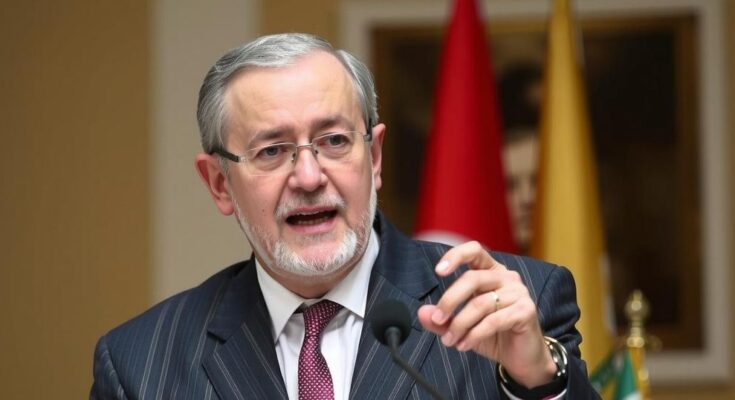Ahmed al-Sharaa, Syria’s new leader, stated that organizing elections may take up to four years, with constitutional drafting needing three years. His comments reflect hopes for democratic changes following the ousting of Bashar al-Assad, alongside reassurances regarding minority rights and a distancing from previous Islamist affiliations.
In a recent interview, Ahmed al-Sharaa, the newly appointed leader of Syria following the ousting of President Bashar al-Assad, indicated that organizing new elections could require up to four years. He further elaborated that drafting a new constitution may take an additional three years. Sharaa’s declarations mark the first detailed commentary on a potential electoral schedule since the regime change that occurred this month. He expressed that substantial transformations in governance and policy might be visible to the Syrian populace within a year.
Sharaa, who heads the Hayat Tahrir al-Sham (HTS) group responsible for removing Assad, addressed concerns regarding the future governance of Syria. He reassured the citizens and neighboring countries of his administration’s intent to move away from Islamist militancy, instead focusing on a potential shift toward democratic governance. However, lingering uncertainty exists about whether HTS will adopt strict Islamic law or embody a more flexible, democratic framework. Sharaa noted that HTS would dissolve during a forthcoming national dialogue conference, distancing the group from its previous affiliations with extremist organizations such as al-Qaeda and ISIS, and asserting its commitment to safeguard minority rights within Syria.
The current political climate in Syria has emerged from over a decade of civil war, which has seen President Bashar al-Assad’s regime face increasing opposition. The recent shift in leadership, exemplified by the rise of Ahmed al-Sharaa, comes with hopes for reform and stabilization. However, this transition raises questions about the direction of governance and the potential for sectarian conflict, given the country’s diverse religious and ethnic composition. The international community, including influential nations such as Russia and Turkey, maintains vested interests in Syria’s evolving political landscape, complicating the situation further as new leadership seeks to navigate these dynamics after years of authoritarian rule.
In summary, Ahmed al-Sharaa’s statements regarding the electoral timeline in Syria reflect significant hopes for a democratic transformation following the end of Assad’s regime. While promising substantial reform, Sharaa acknowledged the challenges ahead, including the drafting of a new constitution and potential sectarian tensions. The international community’s response, particularly that of Russia and the United States, will play a critical role in shaping the future stability and governance of Syria as it transitions away from a history deeply rooted in authoritarianism.
Original Source: www.france24.com




